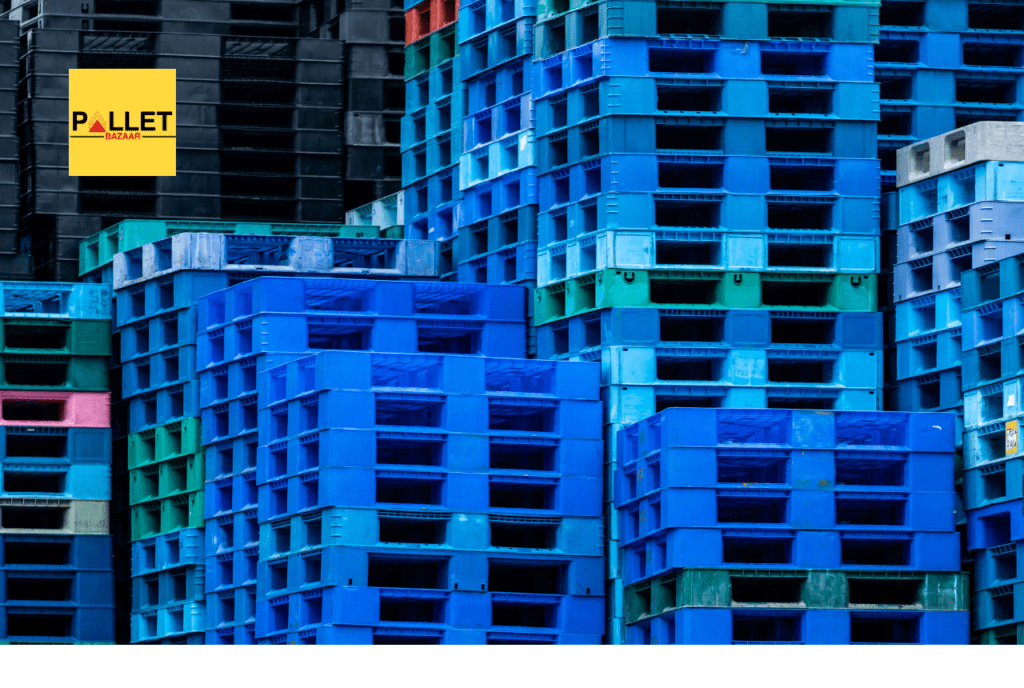Introduction
At Pallet Bazaar, we understand the significance of choosing the right plastic pallets for your business operations. Whether you’re in the manufacturing, logistics, or storage industry, the choice of pallets can greatly impact efficiency, safety, and cost-effectiveness. In this comprehensive guide, we delve into the key factors to consider when selecting plastic pallets, ensuring that you make an informed decision that aligns with your specific requirements.
Plastic Pallets Durability and Strength
One of the primary advantages of plastic pallets is their durability and strength. Unlike traditional wooden pallets, plastic pallets are resistant to moisture, pests, and corrosion. When choosing plastic pallets, it’s crucial to evaluate their load-bearing capacity and structural integrity. Consider factors such as weight distribution, impact resistance, and the ability to withstand varying temperatures and environmental conditions.
Size and Dimensions of Plastic Pallets
Another important consideration when selecting plastic pallets is their size and dimensions. Pallet sizes can vary based on industry standards and specific application requirements. Standard sizes such as 48×40 inches are commonly used in the shipping and logistics sector, while custom sizes may be necessary for specialized applications. Ensure that the plastic pallets you choose are compatible with your storage systems, transportation equipment, and product dimensions to optimize space utilization and operational efficiency.
Hygiene and Cleanliness
In industries such as food and pharmaceuticals, maintaining hygiene and cleanliness is paramount. Plastic pallets offer inherent advantages in terms of hygiene, as they are easy to clean and sanitize. Look for plastic pallets with smooth surfaces, rounded corners, and sealed joints to minimize the accumulation of dirt, debris, and bacteria. Additionally, consider pallets with FDA-approved materials for applications where regulatory compliance is essential.
Sustainability and Environmental Impact
As businesses increasingly prioritize sustainability and environmental responsibility, the choice of plastic pallets can play a significant role in reducing carbon footprint and minimizing waste. Opt for pallets made from recycled materials or those that are recyclable at the end of their lifecycle. Additionally, consider factors such as energy consumption during production, transportation efficiency, and the ability to reuse pallets multiple times to minimize environmental impact.
Cost-Effectiveness
While upfront costs are an important consideration, it’s essential to evaluate the long-term cost-effectiveness of plastic pallets. While plastic pallets may have a higher initial investment compared to wooden pallets, they offer lower total cost of ownership due to their durability, longevity, and reduced maintenance requirements. Factor in considerations such as lifespan, repairability, and resale value when assessing the overall cost-effectiveness of plastic pallets for your business.
Customization Options
Every business has unique requirements when it comes to pallets. Look for suppliers that offer customization options to tailor plastic pallets to your specific needs. Whether it’s incorporating features such as reinforced corners, anti-slip surfaces, or RFID tracking systems, customization can enhance the functionality, safety, and efficiency of pallets in your operations.
Conclusion
Choosing the right plastic pallets is a crucial decision that can impact various aspects of your business, from operational efficiency to product quality and safety. By considering factors such as durability, size, hygiene, sustainability, cost-effectiveness, and customization options, you can make an informed choice that meets your specific requirements and contributes to the overall success of your business.

